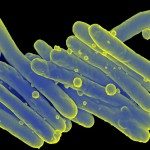Lien vers Pubmed [PMID] – 25302954
Future Microbiol 2014;9(8):969-85
Mycobacterium tuberculosis, the etiological agent of human TB, is the most important mycobacterial pathogen in terms of global patient numbers and gravity of disease. The molecular mechanisms by which M. tuberculosis causes disease are complex and the result of host-pathogen coevolution that might have started already in the time of its Mycobacterium canettii-like progenitors. Despite research progress, M. tuberculosis still holds many secrets of its successful strategy for circumventing host defences, persisting in the host and developing resistance, which makes anti-TB treatment regimens extremely long and often inefficient. Here, we discuss what we have learned from recent studies on the evolution of the pathogen and its putative new drug targets that are essential for mycobacterial growth under in vitro or in vivo conditions.

